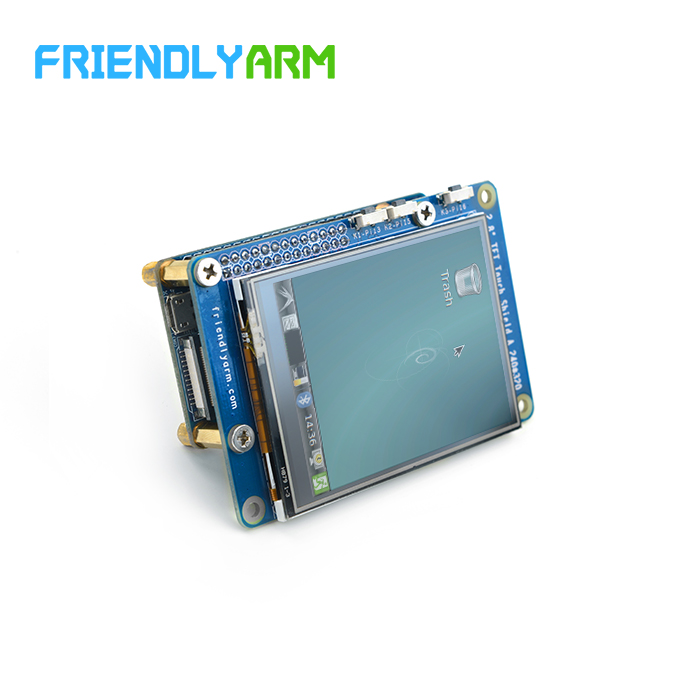Matrix - 2'8 SPI Key TFT
Contents
1 Introduction
2 Features
- PCB dimension(mm):
File:Matrix-2'8 SPI TFT PCB.png
- Pin Description:
| Pin | Description |
| GND | Ground |
| 5V | Supply Voltage 5V |
| LED_EN | Backlight |
| LCD_RESET | Reset |
| LCD_D/C | LCD Data/Command Selection |
| LCD_CS | LCD Chip Selection |
| SPICLK | SPI Clock |
| SPIMOSI | SPI MOSI |
| SPIMISO | SPI MISO |
| T_CS | Touch Chip Selection |
| T_IRQ | Touch Interrupt |
3 Basic Device Operation
4 Download Matrix Source Code
All the matrix modules' code samples are open source. They are maintained on GitHub - https://github.com/friendlyarm/matrix.git
Each branch in this hub contains the matrix modules' code samples for a board that the matrix modules can work with。
- The nanopi branch contains the matrix modules' code samples for the NanoPi
- The nanopi2 branch contains the matrix modules' code samples for the NanoPi 2
- the tiny4412 branch contains the matrix modules' code samples for the Tiny4412
- the raspberrypi branch contains the matrix modules' code samples for the RaspberryPi
Please follow the steps below to get the source code:
Install the git utility on a PC running Ubuntu14.04
$ sudo apt-get install git
Clone the matrix code from GitHub
$ git clone https://github.com/friendlyarm/matrix.git
If this is successful a "matrix" directory will be generated, which will contain all the matrix modules' code samples.
5 Connect to NanoPi 2
5.1 Hardware Connection
Please refer to the following connection diagram to connect the Matrix-2'8 SPI_Key_TFT to the NanoPi 2:

Connection Details:
| Matrix-2'8_SPI_Key_TFT | NanoPi 2 |
| GND | Pin6 |
| 5V | Pin2 |
| LED_EN | Pin11 |
| LCD_RESET | Pin7 |
| LCD_D/C | Pin22 |
| LCD_CS | Pin24 |
| SPICLK | Pin23 |
| SPIMOSI | Pin19 |
| SPIMISO | Pin21 |
| T_CS | Pin26 |
| T_IRQ | Pin18 |
5.2 Compile Test Program
Please login the matrix hub and enter the nanopi2 branch
$ cd matrix $ git checkout nanopi2
Compile the Matrix code
$ make CROSS_COMPILE=arm-linux- clean $ make CROSS_COMPILE=arm-linux- $ make CROSS_COMPILE=arm-linux- install
Note: please make sure to install the cross compiler "arm-linux-gcc-4.9.3" on your PC, which is used to compile files for the NanoPi 2.
Generated library files are under the "install/lib" directory. The test program is under the "install/usr/bin" directory. The modules are under the "modules" directory.
5.3 Load Driver
Please insert a TF card which is flashed with Debian to a Linux host and mount its boot and rootfs sections.
We assume the rootfs is mounted to /media/rootfs then please run the following commands to copy the driver, library and test program to the card.
$ cp modules /media/rootfs/ -r $ cp install/lib/* /media/rootfs/lib/ -d $ cp install/usr/bin/* /media/rootfs/usr/bin/
Insert this TF card to your NanoPi 2, power on and run the following commands to load the driver.
$ cd /modules $ insmod fbtft_device.ko name=matrix-st7789s gpios=dc:97,reset:60,cs:94 $ insmod matrix_ads7846.ko
"fbtft_device" is the LCD's driver. "matrix_ads7846" is the touch driver. If they are successfully loaded the LCD will be cleared and reset.
5.4 Test LCD Display
Please run the following commands to set the display device to the Matrix-2'8_SPI_Key_TFT:
$ sudo FRAMEBUFFER=/dev/fb-st7789s startx &
"&" schedules the program to run background and you will see the following messages:
Log file: "/var/log/Xorg.2.log"Here the message shows that the X window's DISPLAY value is 2
5.5 Calibrate Touch
Please run the following commands to calibrate touch:
$ DISPLAY=:2.0 xinput_calibrator
After you click on the four points highlighted on the LCD you will get calibration done and observe the following messages:
Section "InputClass" Identifier "calibration" MatchProduct "ADS7846 Touchscreen" Option "Calibration" "196 3825 3887 358" Option "SwapAxes" "0" EndSection
Save these calibration data to the "/usr/share/X11/xorg.conf.d/99-calibration.conf" file and reboot the system your touch will be ready to go.
6 Connect to NanoPi
6.1 Preparations
Please install a Debian on a NanoPi and an appropriate cross compiler on a PC. Please refer to wiki:NanoPi
Compile a NanoPi kernel. Note: please use the kernel's source code from the nanopi-v4.1.y-matrix branch.
$ git clone https://github.com/friendlyarm/linux-4.x.y.git $ cd linux-4.x.y $ git checkout nanopi-v4.1.y-matrix $ make nanopi_defconfig $ touch .scmversion $ make
6.2 Hardware Connection
Please refer to the following connection diagram to connect the Matrix-2'8 SPI_TFT to the NanoPi
Matrix-2'8 SPI_TFT_nanopi
Connection Details:
| Matrix-2'8 SPI_TFT | NanoPi |
6.3 Load Driver
Power on the NanoPi and run the following command in Debian's terminal to load drivers:
$ modprobe fbtft_device name=matrix-spi_tft gpios=dc:161,reset:162,cs:163 $ modprobe matrix_ads7846
The "fbtft_device" module is the driver for the st7789s chip and the "matrix_ads7846" module is the driver for the xpt2046 chip.
6.4 Install Package
Please run the following commands in Debian's terminal to install "qtembedded" and "matrix-tslib"
$ apt-get update $ apt-get install qtembedded $ apt-get install matrix-tslib
The "qtembedded" library is what qt applications rely on and the "matrix-tslib" library is what screen calibration relies on.
6.5 Run Test Program
Start Qt applications
$ . /usr/bin/matrix-setqt4env $ /usr/local/Trolltech/QtEmbedded-4.8.5-arm/examples/tetrix -qws
The matrix-setqt4env script sets the environmental variables which Qt and tslib rely on. If it is run on a platform for the first time a screen calibration GUI will be launched. Users need to go through a five-point calibration process to calibrate the screen. The tetrix application is a game developed in Qt4.